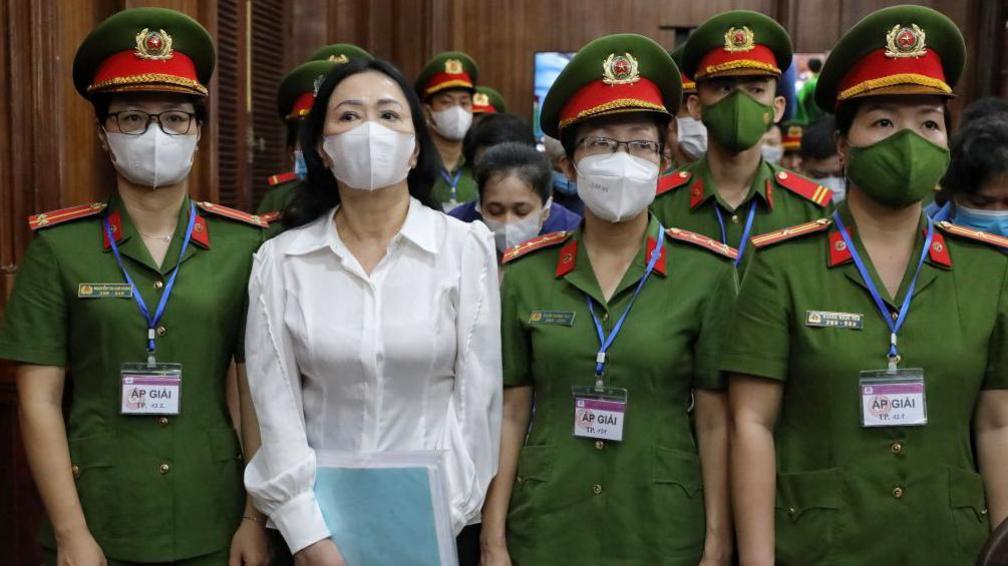In the heart of Southeast Asia, Vietnam’s rapid economic ascent over the past decade was often hailed as a modern miracle. From its post-war to a manufacturing hub global giants like Samsung and Apple, the nation’s GDP growth consistently outpaced regional peers. Yet, beneath this glittering facade lay a ticking time bomb: an overheated real estate market fueled by speculative foreign investments, crony capitalism, and systemic corruption. The 2024 conviction and death sentence of tycoon Truong My Lan—a case involving a staggering $12.5 billion fraud—exposed the rot at the core of Vietnam’s property boom, triggering a collapse that reverberated far beyond its borders. This article explores the rise and fall of Vietnam’s real estate bubble, the role of Japanese, Korean, and Hong Kong capital in inflating it, and the catastrophic consequences of a market built on greed and mismanagement.
The Rise of Truong My Lan: A Symbol of Vietnam’s Ambition
Truong My Lan’s story mirrored Vietnam’s own trajectory from poverty to prosperity. Born in 1956, she began her career selling cosmetics in Ho Chi Minh City’s bustling markets before co-founding Van Thinh Phat (VTP) in 1992, as Vietnam transitioned to a market-driven economy. Over three decades, VTP evolved into a conglomerate controlling prime assets in Hanoi and Ho Chi Minh City, including the iconic Times Square Saigon and Windsor Plaza Hotel. By 2020, Lan was ranked among Vietnam’s wealthiest individuals, her empire a testament to the nation’s economic prowess.
However, Lan’s success was built on a foundation of corruption. Court documents revealed she colluded with government officials to rig bank mergers, siphoning funds through “ghost companies” and bribing regulators. The apex of her scheme involved the 2011 takeover of Saigon Commercial Bank (SCB), which she allegedly used as a personal ATM, funneling $27 billion in illegal loans to herself and allies. Her actions crippled SCB, eroding public trust in Vietnam’s financial system and destabilizing the economy.

The Foreign Capital Invasion: Japan, Korea, and Hong Kong Fuel the Bubble
Vietnam’s real estate frenzy was turbocharged by foreign investors seeking high returns in a market deregulated by the 2015 Housing Law, which allowed foreigners to own property for up to 70 years. Japanese, Korean, and Hong Kong capital poured in, drawn by Vietnam’s young population, rising wages, and proximity to China.
Japanese Investors: The Quiet Giants
Japanese firms like Tokyu Corp and Sumitomo Corporation led the charge, partnering with Vietnamese developers to build luxury complexes and industrial parks. For instance, Tokyu invested $1.2 billion in Bình Dương New City, while Sumitomo eyed the Thu Thiem Financial Center in Ho Chi Minh City. Meanwhile, smaller Japanese funds targeted coastal resorts like Nha Trang, lured by promises of tourism-driven growth.
Korean and Hong Kong Speculators: Riding the Wave
Korean conglomerates such as Hyundai and Samsung invested in mixed-use developments, while Hong Kong tycoons like LI Ka-shing’s CK Asset Holdings explored partnerships with local firms. The allure of double-digit annual price growth—rivaling China’s pre-2015 boom—turned Vietnam into a playground for speculative capital, with luxury condos in Hanoi and Ho Chi Minh City fetching prices comparable to Manhattan.
The Dark Side of Foreign Investment
Foreign capital influx created a dangerous feedback loop: rising prices attracted more investors, further inflating the bubble. By 2022, real estate accounted for 8.3% of Vietnam’s foreign direct investment (FDI), with luxury properties in prime districts selling for over $10,000 per square meter. However, this growth masked critical flaws:
-
Oversupply: Developers built high-end towers faster than demand, leaving 30% of units vacant by 2023.
-
Affordability Gap: Median incomes of $4,000 annually could not sustain prices, forcing locals to rely on risky loans.
-
Regulatory Loopholes: Weak oversight allowed developers to evade foreign ownership caps, with some projects exceeding the 30% limit through shell companies.
The Bubble Bursts: Fraud, Policy Blunders, and Economic Collapse
By 2022, cracks began to appear. The government’s anti-corruption drive, dubbed the “Blazing Furnace,” targeted Lan and her cronies, triggering panic among investors. When Lan was arrested in October 2022, her empire collapsed, revealing $12.5 billion in embezzled funds—nearly 3% of Vietnam’s GDP.
The Domino Effect
-
Credit Freeze: Banks, exposed to $419 trillion in real estate bonds, tightened lending, bankrupting developers like Hung Thinh Corp and Sun Group.
-
Price Collapse: Property values in Hanoi and Ho Chi Minh City plummeted 30%, wiping out $200 billion in wealth.
-
Foreign Flight: Japanese and Korean investors, spooked by regulatory uncertainty, withdrew $5 billion in 2023, deepening the crisis.
Comparisons to Japan’s Lost Decade
The parallels to Japan’s 1990s bubble were striking:
-
Speculative Frenzy: Both markets saw astronomical price hikes fueled by foreign capital.
-
Policy Missteps: Vietnam’s abrupt crackdown on corporate bonds mirrored Japan’s 1989 interest rate hikes, triggering panic.
-
Social Fallout: Middle-class investors, lured by “get-rich-quick” schemes, faced ruin, while homelessness spiked.
The Human Cost: From Riches to Rags
The collapse devastated ordinary Vietnamese. Homeowners who bought during the peak faced negative equity, while developers defaulted on pre-sold units, leaving thousands homeless. In Ho Chi Minh City, construction sites turned into “ghost towers,” their skeletons mocking the nation’s shattered dreams.
Foreign investors fared little better. A Japanese consortium lost $200 million in a Nha Trang resort project, while Korean pension funds wrote off $1.2 billion in bad loans. Hong Kong investors, including Lan’s husband Eric Chu, faced legal battles to recover assets.
The Road to Recovery: Lessons for Vietnam and the World
Vietnam’s crisis offers stark lessons:
-
Regulatory Vigilance: Loose oversight enabled fraud and speculative excess.
-
Balanced Growth: Overreliance on real estate diverted resources from manufacturing and innovation.
-
Transparency: Crony capitalism eroded trust, deterring responsible investment.
To rebuild, Vietnam must:
-
Strengthen Regulation: Enforce foreign ownership caps and audit developer finances.
-
Diversify the Economy: Invest in high-tech industries to reduce reliance on property.
-
Rebuild Trust: Use proceeds from anti-corruption efforts to compensate victims and restore confidence.
A Cautionary Tale for Global Markets
Vietnam’s real estate implosion is a warning to nations seduced by speculative growth. While foreign capital can ignite prosperity, it also amplifies risk when paired with greed and lax governance. As the dust settles, Vietnam must choose between repeating the past or charting a new path—one rooted in sustainable growth and accountability. For global investors, the lesson is clear: even the most promising markets can crumble without integrity.













Leave a comment